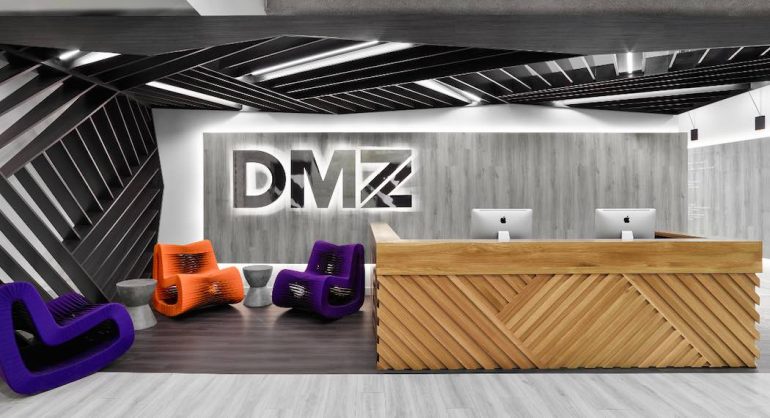Ryerson University-based nonprofit DMZ has officially revealed its redesigned 18-month incubator program for early-stage companies, as the Toronto tech hub continues to refine its approach to startup support.
DMZ’s new incubator model, which BetaKit first reported in January, follows the 11-year-old innovation hub’s recent elimination of its accelerator program. The new model will see DMZ take up to 2.5 percent equity from selected seed and pre-seed startups in return for in-kind services.
“When COVID-19 hit, demand for early-stage founder support became more evident than ever before.”
-Shane Flynn, DMZ
This re-focus on early-stage incubation is part of DMZ’s aim to fill “critical gaps” in the Canadian startup ecosystem,” and comes in response to a “massive increase” in early-stage companies applying to DMZ programs during COVID-19 and a crowded local accelerator space.
DMZ also confirmed to BetaKit the permanent closure of the physical space of Alberta-based accelerator program Zone Startups Calgary (ZSC). The DMZ Ventures-led accelerator is now being brought “under the core DMZ umbrella,” with ZSC companies receiving access to DMZ’s overall programming.
“Post-COVID, we are looking forward to operating under a hybrid model, meaning our services will continue to be accessible to startups across Canada and around the world,” a DMZ spokesperson told BetaKit. “We’re working with Platform Calgary to offer co-working space for startups who need it, along with other DMZ offerings.”
According to Shane Flynn, director of DMZ’s incubator program, “When COVID-19 hit, demand for early-stage founder support became more evident than ever before.”
Flynn said that in 2020, DMZ saw a 35 percent increase in applications for its incubator program. “Recognizing the lack of customized support and resources available to early-stage founders, we knew it was imperative to refocus our efforts,” said Flynn.
DMZ argued that many other incubator programs are around four months long and employ a “one-size-fits-all” format, while its new 18-month incubator model takes “a more customized, hands-on approach.” From DMZ’s perspective, early-stage startups require more specialized support to address their unique challenges, which it said “the current incubator and accelerator ecosystem lacks.”
RELATED: DMZ returns to early-stage focus as hub eliminates “crown jewel” accelerator program
“To foster a competitive and thriving market, the ecosystem needs to encourage startup development by investing in more tailored support,” said Abdullah Snobar, executive director of the DMZ. “Otherwise, we risk stunting the ecosystem’s potential.”
In January, Snobar told BetaKit these changes were driven by a desire to fill this gap and ensure DMZ’s sustainability.
DMZ has been working with its first batch of incubator startups since March 2021. A DMZ spokesperson told BetaKit the incubator has received “some really positive feedback” from its first cohort. “The smaller cohort size has proved to be effective for peer-to-peer learning,” said the spokesperson.
The new model is set to include 15 startups maximum per cohort. The DMZ told BetaKit it plans to welcome incubator cohorts every six months, running up to three cohorts and no more than 45 startups at once. Prior to this change, the DMZ would typically serve over 60 startups in its space at any given time.
DMZ will offer startups 18 months of support in the form of three six-month phases focused on product-market fit, maximizing early sales, and attracting investment.
RELATED: DMZ expands programming for women entrepreneurs, launches networking platform
In addition to its incubator program, DMZ plans to host four six-week cohorts of up 25 startups per year through Bootcamp, a pre-incubator program that helps startups validate their business idea and build a minimum viable product.
The incubator has also developed three-month Fast Track programs for startups in our Women Founders and Black Innovation Program in order to bridge the gap between its Bootcamp and Incubator cohorts.
Along with these programming changes, the hub has also altered its revenue model, eliminating membership and desk fees for portfolio companies and focusing on equity stakes instead, which will be held by DMZ Ventures.
According to DMZ, its incubator will also involve more curated workshops and peer-to-peer sessions, over 60 hours of one-on-one time, as well as increased support with regard to fundraising strategies, pitch coaching, and investor introductions.
Baba Ajayi, founder and CEO of current DMZ member Andie, described DMZ’s incubator as “like a GPS for your startup journey,” adding that “getting timely feedback, introductions, and other resources can significantly increase [founders’] odds of success.”
RELATED: DMZ startups reach milestone of $1 billion in collective funding
Multiple DMZ alumni that BetaKit spoke with under condition of anonymity earlier this year expressed concerns with the DMZ’s programming and revenue model pivot, specifically calling out its deficiencies with regard to connections to VCs. Some sources also expressed concern about the high cost of equity for in-kind services, while others called the changes valuable given a shift in the Canadian tech ecosystem that has left many early-stage companies lacking institutional support.
DMZ alumni and current portfolio companies recently hit $1 billion CAD in collective funding. The milestone is the product of 424 investments raised by 194 of the incubator’s startups and graduates.
The innovation hub also recently expanded its programming for women entrepreneurs with the launch of a new networking platform, Launchpad. Nouhaila Chelkhaoui, the manager of DMZ’s Women Founders program, told BetaKit Launchpad aims to build a strong peer support network for women entrepreneurs, who have been disproportionately impacted by COVID-19. Chelkhaoui said the platform’s flexible, online, self-paced structure “really accommodates women.”
DMZ’s next incubator program cohort begins in September. Applications are currently open and set to close July 31.
Photo courtesy of DMZ


